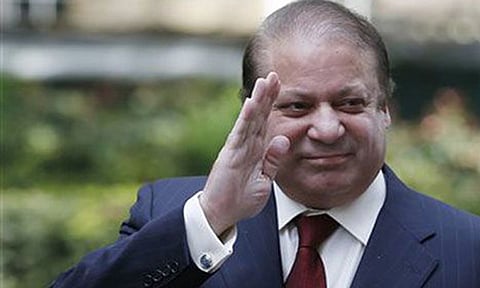Who runs Pakistan?
A failure to bridge the many gaps that exist in various areas of public life is likely to trigger a future political crisis — even without any adventurism by the men in uniform

When Pakistan’s army chief, General Raheel Sharif, publicly spelt out the need for the country to tackle gaps in its system of governance, politicians were quick to suspect him of threatening Pakistan’s democracy.
A relatively rare show of unity across the political spectrum saw rivals becoming bedfellows in the defence of the civilian ruling order. However, one central question still remains unanswered: Who runs Pakistan? Indeed, for the moment, Pakistan, which remains the Islamic world’s only country armed with nuclear weapons and stands central to resolving a series of global challenges, ironically remains rudderless, misgoverned and simply unable to meet many of its internal challenges. In brief, like it or not, there is no one really who can claim to be in charge of Pakistan.
Prime Minister Nawaz Sharif and his ruling Pakistan Muslim League-Nawaz (PML-N), presiding over the centre in Islamabad, should have learned the lessons from the past. Sharif came to power in 2013 as prime minister for the third time, having been previously removed in 1999 in a military coup led by General Pervez Musharraf. As for Sharif’s current tenure in Islamabad, the ruling structure presents a story of squandered opportunities. In spite of some goodwill gestures that raised Sharif’s credentials, notably in his native Punjab province, precious little has been done by way of placing Pakistan squarely on the path to badly-needed reforms.
Ishaq Dar, the Finance Minister whose added claim to fame is that one of his sons is married to one of Sharif’s daughters, has bent over backwards in claiming a so-called economic recovery. Yet, Dar’s personal and political proximity to Sharif notwithstanding, the reality speaks for itself. End of this month will mark the third deadline for Pakistanis to file their tax returns, after the deadline was extended twice before, following the collectors’ failure to fix the glitches and bugs in an otherwise smooth collection system.
Meanwhile, across Pakistan’s rural heartland, which is home to up to 60 per cent of the country’s population, scores of farmers are grappling with an unprecedented crisis caused by a globally-driven crash in prices of commodities. Policy-makers like Dar may well be quick to point towards the crash in farm incomes coming from global trends. And yet, unlike countries that have stepped up to help their farmers, Pakistan’s measures under Sharif in this area have been of little effect.
While such matters may be much too micro to seal the fate of the ruling structure, there are bigger issues that present an ever-growing challenge for Pakistan’s ruling elite. The most vital issue in this area is indeed finding ways to not only deal with the security challenges surrounding Pakistan, but to sustain the success earned against militant groups. In the past year, General Sharif successfully cleaned up parts of the country along the Afghanistan border, where militant groups, under the banner of the Taliban, were holed up. It has been an important piece of success, which has finally demonstrated that Pakistan will not be tolerant towards such hard-line groups.
And yet, winning back territory from militant groups is just the first step towards fighting and winning a battle that is long overdue. At the other end of the spectrum, beyond the military operations, lies the all too vital issue of securing a national political consensus in favour of eliminating militant groups. This requires a comprehensive discussion and debate across Pakistan. Once a consensus is reached by the political representatives, it will then be essential to take this to the grass-roots level, to mobilise the country’s population in favour of a comprehensive campaign against militants.
At the same time, it is also vital for Pakistan’s politicians to discuss exactly where the gaps lie in governance. It is crucial to understand the many gaps in the country’s judicial, police and administrative structures.
At the grass-roots level, services in areas such as health care and education leave a lot to be desired. A visit to a government hospital reveals lack of facilities and infrastructure. From doctors who are absent to non-availability of medicines, it’s a sordid tale. The story is similar in government schools too.
For Sharif and his partners in the ruling structure, tackling Pakistan’s crisis of governance is essential not only to consolidate the country’s outlook, but also its democratic order. As things stand right now, Pakistanis are justified in believing that the country’s political elites are obsessed with issues of self-interest rather than the fate of ordinary citizens.
As for General Sharif’s remarks, which sent the country’s politicians into a tizzy, the army’s critics point towards Pakistan’s history. Past interventions by the army continue to trigger fears of history repeating itself. And yet, so much has gone wrong across Pakistan during Prime Minister Sharif’s tenure that he must take stock of things right now. A failure to bridge the many gaps that exist in various areas of public life is likely to trigger a future political crisis — even without any adventurism by the men in uniform.
In brief, a failure to find an answer to the fundamental question of who runs Pakistan will only leave the door open for future crises.
Farhan Bokhari is a Pakistan-based commentator who writes on political and economic matters.


